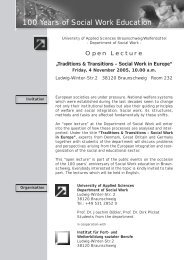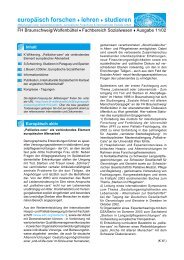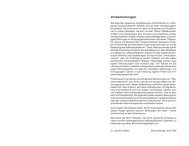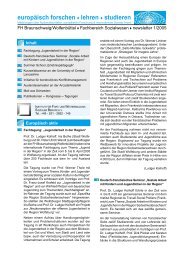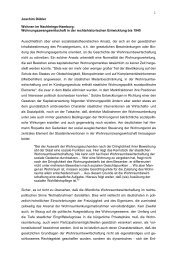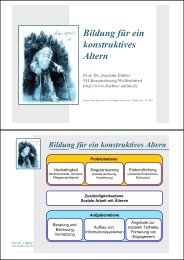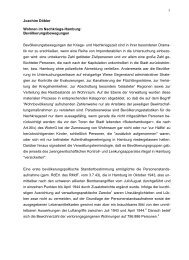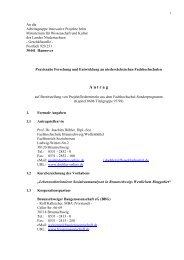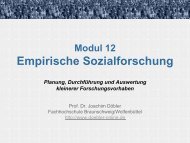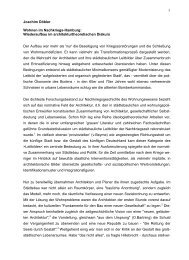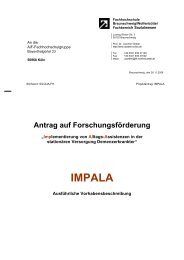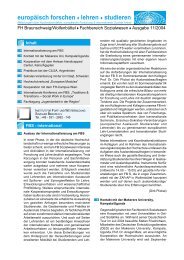CONTRIBUTIONS TO THE BOLOGNA PROCESS - Doebler-online.de
CONTRIBUTIONS TO THE BOLOGNA PROCESS - Doebler-online.de
CONTRIBUTIONS TO THE BOLOGNA PROCESS - Doebler-online.de
Create successful ePaper yourself
Turn your PDF publications into a flip-book with our unique Google optimized e-Paper software.
12promoting concrete measures to achieve tangible forward steps. The 18th June meeting sawparticipation by authoritative experts and scholars from all our countries and provi<strong>de</strong>s us withvery useful suggestions on the initiatives to be taken.We must in particular look at the objective of increasing the international competitiveness ofthe European system of higher education. The vitality and efficiency of any civilisation can bemeasured by the appeal that its culture has for other countries. We need to ensure that theEuropean higher education system acquires a worldwi<strong>de</strong> <strong>de</strong>gree of attraction equal to ourextraordinary cultural and scientific traditions.While affirming our support to the general principles laid down in the Sorbonne <strong>de</strong>claration, weengage in co-ordinating our policies to reach in the short term, and in any case within the first<strong>de</strong>ca<strong>de</strong> of the third millennium, the following objectives, which we consi<strong>de</strong>r to be of primaryrelevance in or<strong>de</strong>r to establish the European area of higher education and to promote theEuropean system of higher education world-wi<strong>de</strong>:Adoption of a system of easily readable and comparable <strong>de</strong>grees, also through theimplementation of the Diploma Supplement, in or<strong>de</strong>r to promote European citizensemployability and the international competitiveness of the European higher education systemAdoption of a system essentially based on two main cycles, un<strong>de</strong>rgraduate and graduate.Access to the second cycle shall require successful completion of first cycle studies, lasting aminimum of three years. The <strong>de</strong>gree awar<strong>de</strong>d after the first cycle shall also be relevant to theEuropean labour market as an appropriate level of qualification. The second cycle should leadto the master and/or doctorate <strong>de</strong>gree as in many European countries.Establishment of a system of credits - such as in the ECTS system - as a proper means ofpromoting the most wi<strong>de</strong>spread stu<strong>de</strong>nt mobility. Credits could also be acquired in non-highereducation contexts, including lifelong learning, provi<strong>de</strong>d they are recognised by receivingUniversities concerned.Promotion of mobility by overcoming obstacles to the effective exercise of free movement withparticular attention to:- for stu<strong>de</strong>nts, access to study and training opportunities and to related services- for teachers, researchers and administrative staff, recognition and valorisation of periods spentin a European context researching, teaching and training, without prejudicing their statutoryrights.• Promotion of European co-operation in quality assurance with a view to <strong>de</strong>velopingcomparable criteria and methodologies• Promotion of the necessary European dimensions in higher education, particularly withregards to curricular <strong>de</strong>velopment, inter-institutional co-operation, mobility schemes andintegrated programmes of study, training and research.We hereby un<strong>de</strong>rtake to attain these objectives - within the framework of our institutionalcompetencies and taking full respect of the diversity of cultures, languages, national educationsystems and of University autonomy - to consolidate the European area of higher education. Tothat end, we will pursue the ways of intergovernmental co-operation, together with those of



